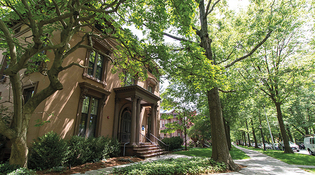 loading
loading
Light & VerityGlobal affairs institute will become a schoolThe Jackson School will be a place to be "more directly involved with public policy."  Kim O'MalleyThe Jackson Institute for Global Affairs—which Yale plans to turn into its newest professional school—is housed on Hillhouse Avenue. View full imageWhat’s the difference between an institute for global affairs and a school for global affairs? For the Jackson Institute, at least, “it’s about the faculty,” says James Levinsohn, its director. Since 2010, Yale’s Jackson Institute for Global Affairs has been offering undergraduate and graduate-level courses—all of them taught by faculty borrowed from other Yale departments and schools, alongside non–tenure-track faculty and senior fellows with appointments at the institute. “There is faculty but they don’t have their tenure lines here,” says Levinsohn. “I buy their time from their home departments.” This spring, the university announced a plan to turn the institute into the Yale Jackson School of Global Affairs. Pericles Lewis, vice president for global strategy and deputy provost for international affairs, says that a committee convened last year to consider the institute’s future “felt the system of borrowing faculty to teach—the bread and butter—was not sustainable.” With an infusion of new money, the Jackson School will have 30 faculty members dedicating 50 percent of their time to the institution, in addition to the non-tenure faculty and the senior fellows. “By moving half their appointment” to Jackson, says Levinsohn, “they will be committing to help build the place out.” Founded in 2010 with a $50 million foundational grant from John (’67) and Susan Jackson, the institute has a mission to promote “education and scholarship on global affairs at Yale.” Jackson “allows our undergraduates to approach global challenges with a multidisciplinary approach,” says Levinsohn. Graduate and professional students at Jackson will learn how to be “more directly involved with public policy,” says Lewis. They will also have access to classes and professors in Yale’s wide range of professional schools: “If you’re trying to tackle an issue like climate change, or public health, you are able to collaborate.” Levinsohn says graduates of the institute’s current MA program go on to work in government, the private sector, and NGOs, in nearly equal proportions. He doesn’t see that changing, but, he adds, “it’s pretty fluid; students who start their career in one sector move fairly seamlessly from one sector to another, private to NGO and back.” Jackson is considerably smaller than schools Lewis and Levinsohn see as its peer institutions, including Princeton’s Woodrow Wilson School, Columbia’s School of International and Public Affairs, and Harvard’s Kennedy School. But they don’t foresee a large increase in the number of enrolled students. For now, the number of MA students (35 in the incoming class) is expected to grow only slightly, while the undergraduate major is likely to stay around its current size, with 60 to 65 sophomores accepted annually. “There is a cohort effect when you know everyone. We want to maintain that,” says Lewis. New faculty will soon be overseeing the curriculum, and Lewis expects that Jackson faculty members will have joint appointments across the university—from history and other academic departments to the Schools of Law, Forestry, and Management. Other aspects of Jackson are expected to remain unchanged. And, at least for the next year, graduate students will continue to receive a master’s in global affairs (MA) or a master’s in advanced study in global affairs (MAS). For now, the school is also expected to remain in its current home: Horchow Hall, the mansion at 55 Hillhouse formerly used by the School of Management. Assuming the university reaches its $200 million fund-raising goal, the school—Yale’s first new professional school since the School of Management opened in 1976—is slated to open in 2022. Lewis is optimistic: he says Yale is already halfway toward its goal.
The comment period has expired.
|
|